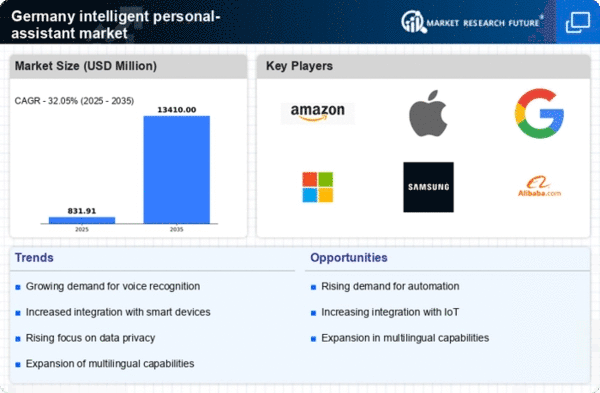Rising Demand for Automation
The intelligent personal-assistant market in Germany experiences a notable surge in demand for automation solutions across various sectors. Businesses and consumers alike are increasingly seeking ways to streamline operations and enhance productivity. This trend is reflected in the growing adoption of intelligent personal assistants, which can automate routine tasks, manage schedules, and provide real-time information. According to recent data, the market is projected to grow at a CAGR of approximately 15% over the next five years. This growth is driven by the need for efficiency and the desire to reduce human error in daily operations. As automation becomes more integral to both personal and professional environments, the intelligent personal-assistant market is likely to expand significantly, catering to a diverse range of applications from personal organization to enterprise-level solutions.
Increased Smartphone Penetration
The proliferation of smartphones in Germany is a significant driver of the intelligent personal-assistant market. With smartphone penetration rates exceeding 80%, consumers are increasingly utilizing their devices for various tasks, including personal assistance. The integration of intelligent personal assistants into mobile platforms has made these tools more accessible and convenient for users. This trend is further supported by the rise of mobile applications that leverage personal assistants for enhanced user experiences. As smartphone usage continues to grow, the intelligent personal-assistant market is likely to benefit from increased engagement and usage frequency. Market analysts suggest that this trend could lead to a 20% increase in the adoption of intelligent personal assistants among smartphone users in the coming years.
Technological Advancements in AI
Technological advancements in artificial intelligence (AI) are profoundly influencing the intelligent personal-assistant market in Germany. Innovations in natural language processing, machine learning, and voice recognition technologies are enhancing the capabilities of personal assistants, making them more intuitive and user-friendly. As AI technology continues to evolve, it is expected that the market will witness an influx of sophisticated features, such as contextual understanding and predictive analytics. This evolution is likely to attract a broader user base, including those who may have previously been hesitant to adopt such technologies. The intelligent personal-assistant market is projected to reach a valuation of €2 billion by 2027, indicating a robust growth trajectory fueled by these technological advancements.
Shift Towards Remote Work Solutions
The shift towards remote work in Germany has created new opportunities for the intelligent personal-assistant market. As more companies adopt flexible work arrangements, there is a growing need for tools that facilitate communication, organization, and productivity in remote settings. Intelligent personal assistants are being utilized to manage virtual meetings, coordinate schedules, and streamline workflows, making them essential for remote teams. This trend is likely to continue as businesses recognize the value of these tools in enhancing collaboration and efficiency. Market forecasts indicate that the demand for intelligent personal assistants in remote work environments could increase by 30% in the next few years, underscoring the importance of these technologies in the evolving workplace.
Growing Interest in Health and Wellness
The intelligent personal-assistant market in Germany is witnessing a growing interest in health and wellness applications. Consumers are increasingly turning to personal assistants for health management, fitness tracking, and wellness advice. This trend is driven by a heightened awareness of health issues and the desire for personalized health solutions. Intelligent personal assistants are being integrated with health monitoring devices, enabling users to track their fitness goals and receive tailored recommendations. This convergence of technology and health is likely to propel the market forward, as more individuals seek to leverage these tools for improved well-being. The market for health-related intelligent personal assistants is expected to grow by approximately 25% over the next few years, reflecting the increasing demand for health-centric applications.
















